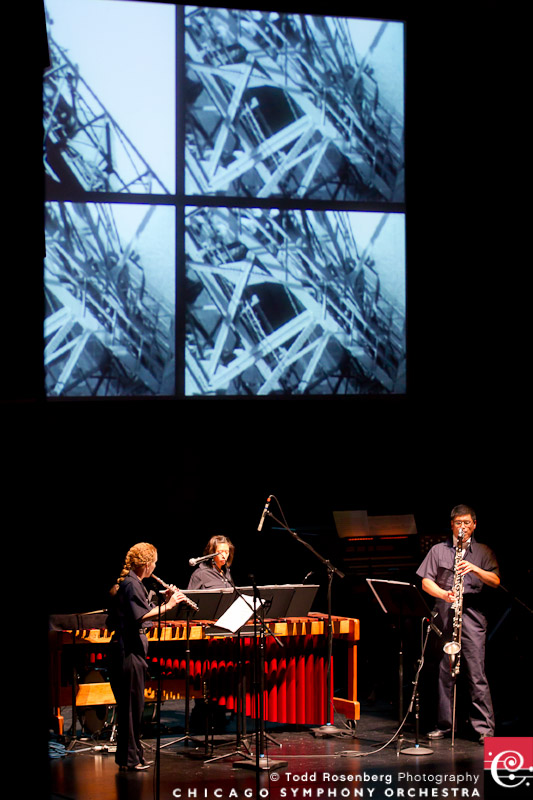Plugged-in MusicNOW opener offers mixed rewards

With all the weekend hubbub over Riccardo Muti’s sudden illness and cancellation of the final two weeks of his fall residency, it was easy to lose sight of the fact that the Chicago Symphony Orchestra has a full slate of events that don’t directly involve its ailing music director, which are going on as scheduled.
Among them is the first MusicNOW concert of the season, which took place Monday night at the Harris Theater. Principal interest in this event was that it marked the official debut of the CSO’s two new composers in residence, Anna Clyne, 30 and Mason Bates, 33. The CSO’s two young composers proved poised and personable interlocutors in speaking about their own works as well as introducing the other composers on hand to talk about their music.
By definition, these new-music programs tend to be variable, but Monday’s opener offered more mixed rewards than usual, even with stellar performances from an ensemble made up largely of CSO members.
The most compelling music heard was Clyne’s steelworks, scored for percussion, bass clarinet, flute and tape. A 1930s industrial film about the steel industry is played on a quadrant of screens, with the speed of the projection synched to the tape, going forward or backward based on the high or low frequencies.
This sounds more gimmicky than it actually is, and Clyne’s steelworks is that rarest of compositions, a multimedia piece that actually works. Set wryly against the dated visual on the joys of smelting, Clyne’s music, originally written for dancers, is consistently enjoyable with its mechanistic electronic sounds, driving insistent marimba and contrasting contemplative solos for the two wind players. This is edgy, individual and compelling music and was given first-class advocacy by CSO members, percussionist Cynthia Yeh, bass clarinetist John Bruce Yeh and flutist Jennifer Gunn.
Bates was represented with his Digital Loom. Inspired by childhood memories of organ music heard while attending church school in Virginia, it offers a demanding organ part that collides with Bates’ patented brand of dance-flavored electronica.
Former D.J. Bates finds a variety of wide-ranging sonorities for the organ from spare, Sunday Evening Club spiritual passages to grandiose E. Power Biggs chords and blinding bravura in the latter sections, all played with bracing virtuosity by organist Isabelle Demers. Still, once Bates’ dance music breaks in with its heavy drums and bass, the music becomes less subtle and interesting, and at five movements, slick and overlong for what is essentially gussied-up electronic club music.
Enrico Chapela’s Li Po started the evening off. Inspired by a Spanish translation of the title Chinese poet’s famous Drinking alone with the moon sonnet, Li Po calls for a large ensemble of 18 musicians set against slide projections of the Spanish translation worked into the original Chinese characters in a variety of guises.
Unlike Clyne’s piece, the visual element didn’t really add much to the music. The Mexican composer’s electronics served up considerable driving energy with electronic nature sounds giving way to agitated amped-up solo string lines and punchy brass. Conductor Cliff Colnot brought fine clarity to the onslaught, but ultimately Chapela’s aggressive cacophony is too noisy and unvaried for its length and, with the number and caliber of these players, seems like a waste of resources.
Sonic relief was provided with two smaller scale chamber works. Marcos Balter’s Vision Mantra for string trio consists of an extended phrase that comes to a rest, which is then continuously repeated with subtle changes to the scoring and harmony.
The Brazilian-born Chicago composer seems to be trying for a hypnotic quasi-Minimalist transportive expression, but despite polished playing by violinist Baird Dodge, violist Li-Kuo Chang and cellist Jonathan Pegis, I found the music dull and repetitive.
Ana Lara’s Bhairav for string quartet proved more interesting. Launched with a mournful cello solo, sensitively played by Pegis against rustling strings, the music soon follows the agitated viola line, and speeds up becoming increasingly firey and astringent before a sudden throwaway coda. Violinists Rika Seko and Dodge, violist Max Raimi and Pegis provided superb advocacy.
Note: While its great to have the composers on hand to speak briefly about their works, that’s not a substitute for detailed notes on the music. Of the five works performed, only the Clyne, Bates and Chapela compositions were given any background information in the small program book, in which five pages were devoted to a history of the Harris Theater, information about its facilities and a list of upcoming events. When most of the music is new to audience members as here, it’s essential to provide details on all the works represented.
Posted in Performances




